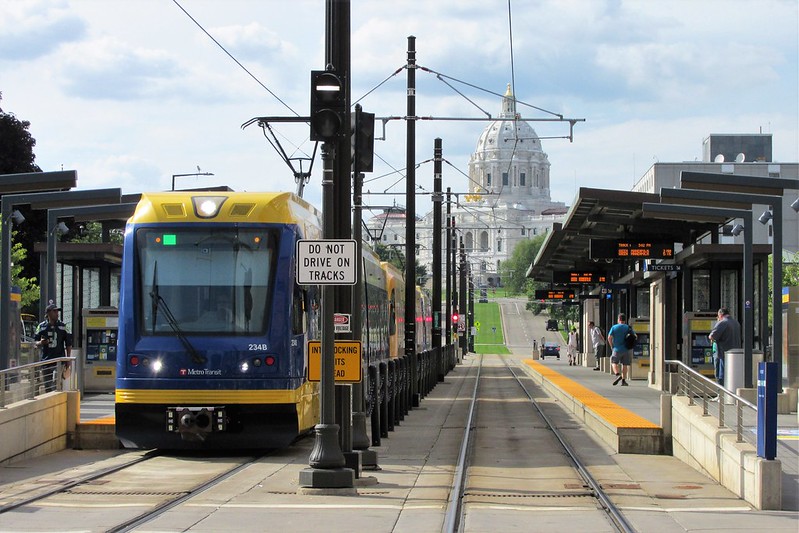How Minnesota set a national example in climate legislation

Minnesota made waves last week by passing a landmark transportation spending bill that will fund transit expansions and passenger rail service while reducing transportation emissions. The law, which was passed by razor-thin margin, serves as a blueprint for transformative transportation legislation.
Master class in political will
Minnesota passed ambitious climate goals in 2007, as many states were doing during that era. But as with other states, Minnesota had a difficult time following through with concrete actions to meet those goals.
But far from giving up or taking half-measures, Minnesota legislators are willing to risk their seats to make big moves. For example, Speaker of the House Melissa Hortman and Senate Majority Leader Kari Dziedzic prepared and executed an extensive legislative agenda that included a law to move Minnesota to 100 percent clean energy by 2040. That bill provided transportation champions enough momentum to pass other transformational changes, including a new transportation funding agreement passed last week.
This rare, fast-moving legislative push was made possible by the work of advocacy groups like Move Minnesota. Even when there was no hope of passing things like transit funding and limits on vehicle miles traveled (VMT), they worked with climate-forward legislators to draft, refine, and advocate for the provisions that eventually made their way into this law. They encouraged legislators to start from a vision for what the future of transportation can look like and work from there, rather than start from a dollar figure. Then during the 2023 legislative session, they organized a diverse group of transit users and supporters to testify at Transit Equity Day-themed hearings in both the House and the Senate. This was a crucial move in building momentum for this law, bringing in the voices of educators, students, cultural and faith leaders, economic development advocates, transit service providers and union leaders, mobility and disability justice advocates, bikers, elected officials, and both local and national environmental and transportation policy experts.
Not only did Minnesota legislators lap other states that call climate a priority, but they did it with the slimmest of majorities: one seat in the Senate and six in the House. There was strong opposition from the minority, which panned the bill as “regressive taxes that hurt lower-income Minnesotans the most.”
The passage of this legislation is a perfect example of why building capacity and investing in champions is a critical step in sparking change.
What’s in the law?
At a glance, the new law passed by the Minnesota legislature provides:
- The authority for Metro Transit to deploy non-police personnel to check fares and issue administrative citations.
- $195 million to design and build the Northern Lights Express, a new passenger rail route that will operate between the Twin Cities and Duluth.
- $150 million to erase a transit funding deficit in the Twin Cities region.
- $300 million annually to build out and improve the Twin Cities region’s Bus Rapid Transit (BRT) system.
- Means-tested tax credits for up to 75 percent of the cost on an electric-assisted bicycle.
- $2 million for a pilot program to connect people experiencing homelessness or mental health and addiction issues to social services.
These provisions are funded by:
- Increasing Minnesota’s gas tax by 5 cents/gallon by 2027 by indexing it to inflation. This provision will provide stable funding not only to transit and passenger rail, but the entirety of Minnesota’s transportation system.
- Increasing the statewide sales tax by 0.25 percent to fund housing programs and projects.
- Increasing the sales tax in the Twin Cities region by an additional 0.75 percent.
- Imposing a $0.50 fee on deliveries over $100 in value.
It also requires that the Minnesota Department of Transportation (MnDOT) assess proposed highway expansion projects for consistency with their established greenhouse gas reduction goals, specifically by reducing the VMT on Minnesota’s roads. If MnDOT authorizes a project that increases VMT, they will need to offset the increased emissions by linking the project with a portfolio of other projects that reduce VMT by the same amount or more.
While the transit and passenger rail funding provisions are exciting, this portion of the law may have an even greater effect. Many states have passed climate laws, goals, policies, and mandates, but few get at the real drivers of transportation emissions like this new law. In fact, Minnesota and Colorado are now the only two states to enact such rigorous processes to reduce transportation emissions. Some states enact ambitious goals, but fail to follow through.
Other states should take note—this move could yield Minnesota northwards of $91 billion in returns by 2050.
Takeaways for national politics
The actions of Minnesota’s slim majority stand in stark contrast with the 117th congress and Biden administration, who have taken a ham-handed approach to curtailing transportation emissions. Despite passing historic transportation investments through the IIJA, nationwide transportation emissions could still be poised to drastically rise in coming years. And when the Biden administration released a memo that merely suggested transformational change to transportation spending, they quickly cowed to Republican pressure and rescinded it.
Perhaps climate forward legislators in the states, federal government, and even the Biden administration could learn from MN legislators and move forward with transformative climate action.




















2 Comments